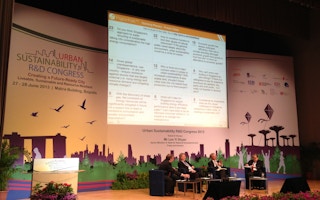Singapore has been called a ‘hub’ of many things, being strategically located at the centre of fast-growing Asia.
To continue reading, subscribe to Eco‑Business.
There's something for everyone. We offer a range of subscription plans.
- Access our stories and receive our Insights Weekly newsletter with the free EB Member plan.
- Unlock unlimited access to our content and archive with EB Circle.
- Publish your content with EB Premium.
One of those is a luxury hub, where there are more people driving ostentatious sports cars on this tiny island than anywhere else in the world, where big energy-guzzling bungalows are sold for record-breaking prices and where malls feature branded stores selling bags and shoes priced at levels that could fund entire poverty-alleviating programmes in least developed countries.
So it is somewhat an interesting paradox that Singapore is increasingly known as Asia’s sustainability hub – given its leadership in environmental technologies such as water and its forward-thinking policies on city management that has been recognised internationally.
This dichotomy emerged during an interesting panel discussion at the Urban Sustainability R&D Congress held last week at Biopolis by Singapore’s Ministry of National Development for government agencies, research institutes and private sector companies to discuss R&D responses to urban sustainability challenges.
Some questions from the audience included whether Singapore’s water system was sustainable given its high energy consumption, and how do we condition humans to care about sustainability and the environment?
Professor Sir David King, former UK chief scientific adviser, provided the most illuminating response.
What it comes down to is changing the way society gives people status, he said.
“
Stop admiring young men in Ferraris.
Sir David King
At the moment, we accord high status to people who are high consumers of energy, goods and services, when in fact we should be inverting this and giving respect to people who tread lightly and who do not over-consume.
Sir David, from the University of Cambridge and chairman of the Future Cities Catapult Centre, recounted how he made headlines in the British media recently when he responded to a young female questioner who asked him about what people like her could do to help: “Stop admiring young men in Ferraris.”
Explaining this to laughter from the audience, he said that he was not attacking sports cars but trying to illustrate the point that people are misguidedly impressed by those who show off their use of energy – buying big houses, fuel-guzzling cars, for example – as a means of showing they are wealthy or superior.
“This goes to the root of the problem. If we’re going to move [the sustainability issue] from an academic problem to a basic level, we need to change the status that we give people.”
Sir David’s words, which resonated with the audience who enthusiastically applauded, goes to the heart of the solution needed to transform consumer behaviour.
Being wealthy is not a crime, and in fact the desire to improve one’s lot is a powerful driving force that has propelled human civilisation for thousands of years – but being wealthy does not and should not have to equate to the over-consumption of goods and resources.
I wonder how many people realise that flaunting such over-consumption – whether it is taking pictures of said consumption and plastering it all over Facebook, or looking down their noses at people who are unable to attain it – can come across so nauseating to the rest of society.
And if you don’t find it distasteful, you should.
That is the thrust of Sir David’s argument – it is time for a cultural change.
When the wave of public opinion turns against over-consumption as a symbol of status, then we will have truly changed consumer behaviour and set the world on a sustainable path.
Some like-minded visionary business leaders are leading this movement. One of whom is founder of Patagonia Yvon Chouinard who recently said “Make consumption uncool.” The company last year ran New York Times ads with a Patagonia jacket under the headline, “Don’t buy this jacket.”
There was another question posed to the panelists, moderated by former head of civil service Peter Ho, on the merits of GDP (gross domestic product) as an indicator of success.
Sir David noted it was a good question because GDP as a measure of success, “leads to all sorts of misbehaviour… including short-termism”.
“The higher the level of consumption, the higher your GDP will be. Using this as a measure, making more is a good thing. This means having to replace goods more quickly… this is not sustainable,” he said.
He suggested using an index measuring human well-being as a replacement of GDP to indicate how well a country is doing.
Professor Herbert Girardet, co-founder of the World Future Council, who also spoke at the discussion, surfaced another idea, calling for the world’s cities to move from ‘Petropolis’ to ‘Ecopolis’.
Cities have to rehaul the way they operate and move away from polluting fossil fuels to include renewable energy sources. Central to the ‘Ecopolis’ concept is the circular economy, in which resources are in use for as long as possible, extracted of the maximum value while in use, and then recovered and regenerated as products and materials at the end of each service life.
“
When the wave of public opinion turns against over-consumption as a symbol of status, then we will have truly changed consumer behaviour and set the world on a sustainable path.
Noting that Asia is set for rapid urbanisation that will see the mass movement of people from rural areas to cities, he said cities might be more sustainable than dispersed, rural lifestyles but when people move from rural to city areas, their resource consumption goes up four-fold. This is why making the most out of resources is important.
Prof Herbert further remarked that if the world consumed at Singapore’s current resource consumption levels, we would require 2.5 planets.
“So how do we allow urbanisation to take place without greater demands on the biosphere? That is the greatest challenge for urban planners,” he said.
Mr Jens Laustsen, technical director at the Global Buildings Performance Network, added that the solutions lie in “taking the best practices we have and upscale it”.
He posted an interesting question that provided much food for thought on the relationship between sustainability and consumption: “When you get rich, you get dirty… why can’t we go from poor to rich and clean?”









